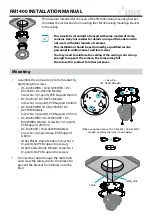
10
Building the Bench
In the bench kit you'll find a large board with notches in the two sides, two
“
T
”
shaped bench sides, a 2x4
piece with dowels on each end, two long barrel bolt assemblies, and two slim bolts with wing nuts.
You'll
also find two heavy rods with holes drilled at one end.
First take the
“
T side and the 2x4 piece.
Push the 2x4 piece into the holes on the side of the
“
T
”
piece.
The
holes in the 2x4 piece should face downwards toward the T.
Now do the same for the other T piece.
Now
take the barrel bolt assembly and place the round nut into the large hole underneath the 2x4.
The slot on
the nut should be parallel with the sides of the 2x4 piece.
Insert the bolt through the hole on the outside of
the
“
T
”
shaped
leg and tighten it with the wrench provided.
Do the same procedure for the other side.
Now take the heavy rods and slide them through one set of the large holes at the top of the T shaped
legs.
One rod should have its hole at the far side and the other rod should have its hole at the near
side.
Now look at the seat and you will see one hole at each end.
Align these holes with the holes in the
metal rods, insert the thin bolts and secure with a wing nut on the bottom.
Hammer the tops of the bolts to
have them indent themselves into the body of the seat.
Note that you have four sets of holes in the bench
legs;
this will allow you to adjust the seat to your comfort level.
Hanging the shafts
(text from video tutorial)
Installing the pulleys
To install the pulleys, find the three long rods with holes in the ends, a bag of pulleys and three cotter pins.
The rails have three blocks preinstalled –
one on the left underside, one on the right underside, and one on
the right top. Note that for each set of blocks, the back ones are drilled all the way through and the front ones
are drilled partway through from the back.
First, count out 3 piles of 16, 24 or 32 pulleys depending on the number of shafts you have. Then take one pile
and start on the left underside. Take a metal rod and slide the end without the hole through the hole in the
back block from back to front. As the rod goes through the hole, slide the pulleys on the rod between the
blocks.
Note that each pulley has a rise on one side.
When you slide on the pulleys make sure the rises face
the same direction.
After you get all the pulleys onto the rod, push the rod end into the hole in the front pul-
ley. After you push rod all the way thought, you'll see that the little hole drilled into the rod will be inside of
the rear block.
Slip the straight side of the cotter pin through the hole and secure it.
Your pulleys are now
secured for that set of blocks.
Repeat the same procedure for the other two sets of blocks.
Video Tutorial
-
hanging the shafts and connecting the control box
Follow this link for the video:






































